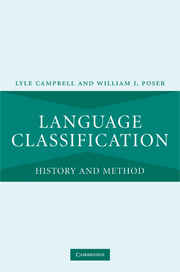Book contents
- Frontmatter
- Contents
- List of figures, tables, and charts
- Acknowledgments
- Preface
- 1 Introduction: how are languages shown to be related to one another?
- 2 The beginning of comparative linguistics
- 3 “Asiatic Jones, Oriental Jones”: Sir William Jones’ role in the raise of comparative linguistics
- 4 Consolidation of comparative linguistics
- 5 How some languages were shown to belong to Indo-European
- 6 Comparative linguistics of other language families and regions
- 7 How to show languages are related: the methods
- 8 The philosophical–psychological– typological–evolutionary approach to language relationships
- 9 Assessment of proposed distant genetic relationships
- 10 Beyond the comparative method?
- 11 Why and how do languages diversify and spread?
- 12 What can we learn about the earliest human language by comparing languages known today?
- 13 Conclusions: anticipating the future
- Appendix: Hypothesized distant genetic relationships
- References
- Index
12 - What can we learn about the earliest human language by comparing languages known today?
Published online by Cambridge University Press: 22 September 2009
- Frontmatter
- Contents
- List of figures, tables, and charts
- Acknowledgments
- Preface
- 1 Introduction: how are languages shown to be related to one another?
- 2 The beginning of comparative linguistics
- 3 “Asiatic Jones, Oriental Jones”: Sir William Jones’ role in the raise of comparative linguistics
- 4 Consolidation of comparative linguistics
- 5 How some languages were shown to belong to Indo-European
- 6 Comparative linguistics of other language families and regions
- 7 How to show languages are related: the methods
- 8 The philosophical–psychological– typological–evolutionary approach to language relationships
- 9 Assessment of proposed distant genetic relationships
- 10 Beyond the comparative method?
- 11 Why and how do languages diversify and spread?
- 12 What can we learn about the earliest human language by comparing languages known today?
- 13 Conclusions: anticipating the future
- Appendix: Hypothesized distant genetic relationships
- References
- Index
Summary
‘Proto-World’ Conjectural protolanguage from which, according to some applications of mass comparison, all later languages have developed.
(P. H. Matthews, The concise Oxford dictionary of linguistics. 1997:302)Introduction
Looking back from modern and attested older languages, what can we find out or reasonably hypothesize about the earliest human language (or languages)? The origin and evolution of human language is currently a very active area of scholarship, though curiously there appear to be more hypotheses than facts. That is, in spite of some very clever recent thinking in various directions, there is little of real substance from the remote past to work with, leaving speculation to dominate. Nevertheless, one area in which concrete data have been explored in language origins research is comparison of lexical and structural material from known languages. Attempts to understand something of the origin and evolution of the earliest human language are of relevance to the goals of this book because many involve very long-range classifications of the world's languages and claims about distant genetic relationship. In this chapter we deal with the lexical data which some scholars have used in attempts to reach conclusions about the earliest human language, and also less directly with some structural traits. The goal of the chapter is to determine what, if anything, can be learned about the earliest human language or languages based on comparisons of the linguistic evidence extant in modern and older attested languages.
Information
- Type
- Chapter
- Information
- Language ClassificationHistory and Method, pp. 364 - 393Publisher: Cambridge University PressPrint publication year: 2008
